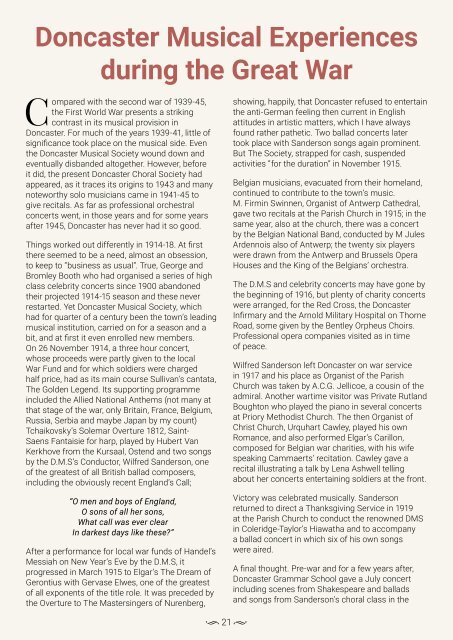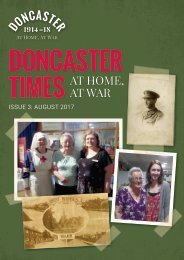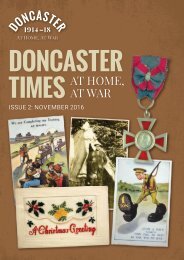Doncaster Times Issue 1 - June 2016
Doncaster Times is a biannual publication of articles and pieces researched and written by members of the public, volunteers and professionals. For its first four years, the magazine will feature articles about Doncaster during the First World War, to commemorate the centenary. The most recent publication is available in hard copy only, available to purchase from Doncaster Museum and Art Gallery, Doncaster Central Library and the Tourist Information Centre.
Doncaster Times is a biannual publication of articles and pieces researched and written by members of the public, volunteers and professionals. For its first four years, the magazine will feature articles about Doncaster during the First World War, to commemorate the centenary. The most recent publication is available in hard copy only, available to purchase from Doncaster Museum and Art Gallery, Doncaster Central Library and the Tourist Information Centre.
You also want an ePaper? Increase the reach of your titles
YUMPU automatically turns print PDFs into web optimized ePapers that Google loves.
<strong>Doncaster</strong> Musical Experiences<br />
during the Great War<br />
Compared with the second war of 1939-45,<br />
the First World War presents a striking<br />
contrast in its musical provision in<br />
<strong>Doncaster</strong>. For much of the years 1939-41, little of<br />
significance took place on the musical side. Even<br />
the <strong>Doncaster</strong> Musical Society wound down and<br />
eventually disbanded altogether. However, before<br />
it did, the present <strong>Doncaster</strong> Choral Society had<br />
appeared, as it traces its origins to 1943 and many<br />
noteworthy solo musicians came in 1941-45 to<br />
give recitals. As far as professional orchestral<br />
concerts went, in those years and for some years<br />
after 1945, <strong>Doncaster</strong> has never had it so good.<br />
Things worked out differently in 1914-18. At first<br />
there seemed to be a need, almost an obsession,<br />
to keep to “business as usual”. True, George and<br />
Bromley Booth who had organised a series of high<br />
class celebrity concerts since 1900 abandoned<br />
their projected 1914-15 season and these never<br />
restarted. Yet <strong>Doncaster</strong> Musical Society, which<br />
had for quarter of a century been the town’s leading<br />
musical institution, carried on for a season and a<br />
bit, and at first it even enrolled new members.<br />
On 26 November 1914, a three hour concert,<br />
whose proceeds were partly given to the local<br />
War Fund and for which soldiers were charged<br />
half price, had as its main course Sullivan’s cantata,<br />
The Golden Legend. Its supporting programme<br />
included the Allied National Anthems (not many at<br />
that stage of the war, only Britain, France, Belgium,<br />
Russia, Serbia and maybe Japan by my count)<br />
Tchaikovsky’s Solemar Overture 1812, Saint-<br />
Saens Fantaisie for harp, played by Hubert Van<br />
Kerkhove from the Kursaal, Ostend and two songs<br />
by the D.M.S’s Conductor, Wilfred Sanderson, one<br />
of the greatest of all British ballad composers,<br />
including the obviously recent England’s Call;<br />
“O men and boys of England,<br />
O sons of all her sons,<br />
What call was ever clear<br />
In darkest days like these?”<br />
After a performance for local war funds of Handel’s<br />
Messiah on New Year’s Eve by the D.M.S, it<br />
progressed in March 1915 to Elgar’s The Dream of<br />
Gerontius with Gervase Elwes, one of the greatest<br />
of all exponents of the title role. It was preceded by<br />
the Overture to The Mastersingers of Nurenberg,<br />
showing, happily, that <strong>Doncaster</strong> refused to entertain<br />
the anti-German feeling then current in English<br />
attitudes in artistic matters, which I have always<br />
found rather pathetic. Two ballad concerts later<br />
took place with Sanderson songs again prominent.<br />
But The Society, strapped for cash, suspended<br />
activities “for the duration” in November 1915.<br />
Belgian musicians, evacuated from their homeland,<br />
continued to contribute to the town’s music.<br />
M. Firmin Swinnen, Organist of Antwerp Cathedral,<br />
gave two recitals at the Parish Church in 1915; in the<br />
same year, also at the church, there was a concert<br />
by the Belgian National Band, conducted by M Jules<br />
Ardennois also of Antwerp; the twenty six players<br />
were drawn from the Antwerp and Brussels Opera<br />
Houses and the King of the Belgians’ orchestra.<br />
The D.M.S and celebrity concerts may have gone by<br />
the beginning of 1916, but plenty of charity concerts<br />
were arranged, for the Red Cross, the <strong>Doncaster</strong><br />
Infirmary and the Arnold Military Hospital on Thorne<br />
Road, some given by the Bentley Orpheus Choirs.<br />
Professional opera companies visited as in time<br />
of peace.<br />
Wilfred Sanderson left <strong>Doncaster</strong> on war service<br />
in 1917 and his place as Organist of the Parish<br />
Church was taken by A.C.G. Jellicoe, a cousin of the<br />
admiral. Another wartime visitor was Private Rutland<br />
Boughton who played the piano in several concerts<br />
at Priory Methodist Church. The then Organist of<br />
Christ Church, Urquhart Cawley, played his own<br />
Romance, and also performed Elgar’s Carillon,<br />
composed for Belgian war charities, with his wife<br />
speaking Cammaerts’ recitation. Cawley gave a<br />
recital illustrating a talk by Lena Ashwell telling<br />
about her concerts entertaining soldiers at the front.<br />
Victory was celebrated musically. Sanderson<br />
returned to direct a Thanksgiving Service in 1919<br />
at the Parish Church to conduct the renowned DMS<br />
in Coleridge-Taylor’s Hiawatha and to accompany<br />
a ballad concert in which six of his own songs<br />
were aired.<br />
A final thought. Pre-war and for a few years after,<br />
<strong>Doncaster</strong> Grammar School gave a July concert<br />
including scenes from Shakespeare and ballads<br />
and songs from Sanderson’s choral class in the<br />
•<br />
21 •




